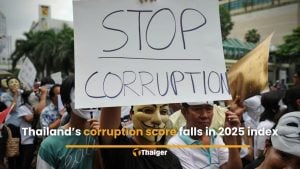Thailand’s struggle with informal debt likened to modern-day slavery

The struggle with informal debt, described as a form of modern-day slavery, has been prioritised on a national level by Srettha Thavisin, the Prime Minister. A vast number of individuals are trapped in both formal and informal debt cycles, with interest rates for the latter often surpassing the 15% legal limit. The government’s estimated informal debt stands conservatively at 50 billion baht, according to PM Srettha.
He remarked during a press conference on the national agenda and the measures to tackle informal debt last month, “The government, in cooperation with administrative organisations and the police, will act as an intermediary to ensure equitable treatment for both creditors and debtors. When the government has revived the economy, people should be able to escape these cycles of perpetual debt.”
The debt problem is further complicated by low income levels, uneven economic recovery, and certain behavioural patterns among Thais that plunge them deeper into debt. Young adults who are attracted to the buy now, pay later (BNPL) system, heavily promoted through online and offline marketing, require special attention, according to Danucha Pichayanan, secretary-general of the National Economic and Social Development Council (NESDC).
The “Thailand Buy Now Pay Later Market Report 2022” reveals that while 96% of Thai BNPL users have not defaulted on their repayments, this practice could potentially lead to household debt issues in the future. Over half of Gen Y and Millennials earning less than 15,000 baht (US$439.44) per month are likely to use BNPL. In Thailand, the most common BNPL purchases are jewellery and clothing.
Thailand’s household debt-to-GDP ratio is one of the highest in Asia, trailing only South Korea and Hong Kong, and ranks 12th globally, as per the Bank of Thailand. The NESDC states that in the second quarter of 2023, household debt amounted to 16.1 trillion baht (US$471 billion), a 3.6% increase year-on-year, comprising 90.7% of the country’s GDP.
Sompob Manarangsan, president of the Panyapiwat Institute of Management, asserts that the solution to informal debt lies in enhancing people’s economic status and alleviating poverty. He praises China’s unprecedented poverty reduction efforts, which have lifted 800 million people out of poverty, especially under President Xi Jinping’s leadership. According to Sompob, China’s two-pronged approach includes broad-based economic transformation to increase average incomes and targeted support to alleviate persistent poverty.
Sompob also points out the crucial role of fiscal measures in reducing poverty. He highlights the need for policies that increase governmental revenue and targeted state spending to extend coverage of the vulnerable segment. He states that all past Chinese leaders, including the current one, share a common experience in rural development, reported Bangkok Post.
Pornchai Thiraveja, director-general of the Fiscal Policy Office, explains that nano-finance and pico-finance are the Finance Ministry’s initiatives to expand formal financing sources to low-income earners and informal workers. This move aims to deter loan sharks and encourage underground lenders to join the formal lending system. As of September 30, 68 nano-finance firms lent to 2.05 million accounts, with total outstanding loans of 38.8 billion baht (US$1.136 billion) and non-performing loans accounting for 2.58 billion baht (US$75 million).
In related news, Thai government has reported progress in its ongoing battle against informal debts.
Latest Thailand News
Follow The Thaiger on Google News:


























